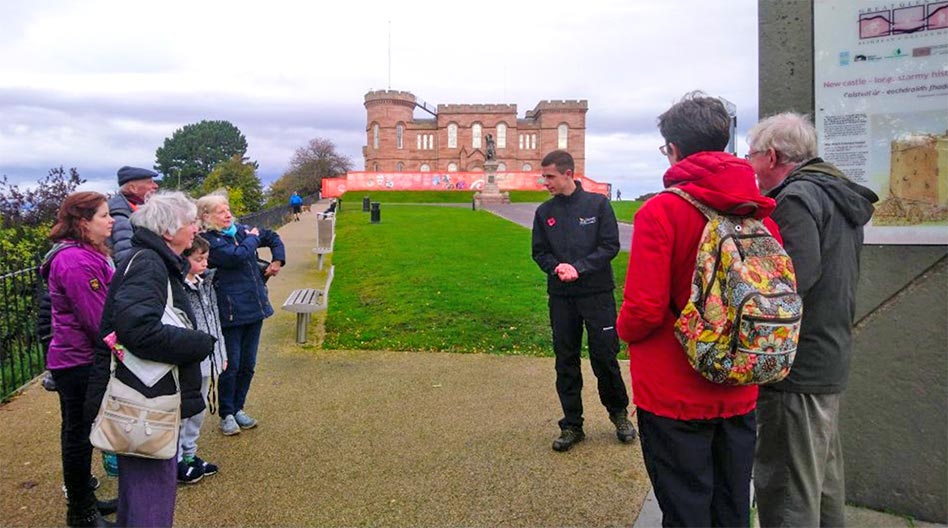Inspiring the ‘Spirit of the Highlands’
How collaborative historical research has assisted transformative regional cultural practice
The research of UHI Centre for History staff helped inspire the concept and application of the ‘Spirit of the Highlands’, the organising principle for the current, multimillion-pound Inverness Castle project, the biggest single heritage development in Highland region of the last century.
Unit of assessment | History

The Scottish Highlands has for centuries been a culturally rich and internationally connected region, but since the 1700s it has been more frequently characterised as peripheral. Research from the Centre for History at UHI has challenged this characterisation, emphasising instead human agency: the vitality and resilience, sometimes against the odds, of the region’s social and linguistic communities.
Our research on this theme, and publications by Dr Jim MacPherson, Professor David Worthington and Professor James Hunter (now retired) in particular, have helped change cultural practice in the Highland Council locality, the largest local government area in the UK. High Life Highland, the partner for this impact case study, is a service delivery organisation providing cultural, leisure and learning services on behalf of the Council. High Life Highland incorporated this new understanding from our research in its approach to its museums, libraries and archives, most obviously integrating this into its concept of the ‘Spirit of the Highlands’.
The Centre for History’s collaborative projects with High Life Highland first began to accelerate in 2015. A chain of interlocking events was set in motion at the Kingussie Heritage Festival of 2015. This inspired the ‘Badenoch Textiles’ project, an Arts and Humanities Research Council (AHRC) Collaborative Doctoral Award studentship, led by the Centre for History’s Dr Jim MacPherson. The project saw co-production of Centre for History research with a High Life Highland-run museum, the Highland Folk Museum. By using eighteenth-century techniques for flax growth and production, it explored how a ‘learning by doing’ approach could help Highland Folk Museum to become involved in the research process and drive forward their activities both at regional and national level.
Publications by Centre for History staff underpinned collaborations over subsequent years between the Centre and Highland region’s museums, libraries and archives. These helped to inspire a new concept – the ‘Spirit of the Highlands’ – today manifested in the form of the Inverness Castle Project.
Today, Professor David Worthington represents UHI on the Inverness Castle Project Delivery Group, chaired by the Scottish Government’s Cabinet Secretary for Rural Economy and Tourism, Fergus Ewing MSP. Moreover, Worthington’s leadership also of the UHI-High Life Highland advisory group to the project, established in 2018, focuses on how the Centre for History’s community-oriented research can be applied in a wider, cross-disciplinary way. Thus, Centre for History researchers have positioned their work as a fulcrum around which relations between the Castle Project team and the university hinges.
Most obviously, the ‘Spirit of the Highlands’ has involved High Life Highland’s gathering and curation of hundreds of ‘stories’ from across the region. The stories will provide key content for the visitor attraction on Castle Hill and the Centre for History is taking a significant role in their selection, while our students have already been called on to research a number of the submissions. In this way, our research continues to inspire the ‘Spirit of the Highlands’, helping it materialise as the framework for a project that is having tangible, transformative effects on the region’s cultural life, on a scale bigger than that of any other development of the last century.
“Historical research at UHI has been an inspiration to me as an artist in recent times, particularly through their work showing the strength, agency and spirit of Highland people, past and present”
– Julie Fowlis, Gaelic singer and composer
Research team
Related websites
- Firths and Fjords: ‘The Spirit of the Highlands’, 25 June 2020
- UHI Blog: Revealing the ‘Spirit of the Highlands’, 6 November 2020
- The Highland Council: University student volunteers explore the Spirit of the Highlands, 6 December 2021
- The Highland Council: Inverness Castle transformation – next step forward, 7 March 2022
- BBC News: Inverness Castle to celebrate ‘spirit of the Highlands’, 29 August 2019
- Inverness Courier: Four student volunteers have done research to showcase the Spirit of the Highlands
- Ross-shire Journal: Step back in time for UHI history students…12 December 2021
Follow on
Twitter | @UHIHistory